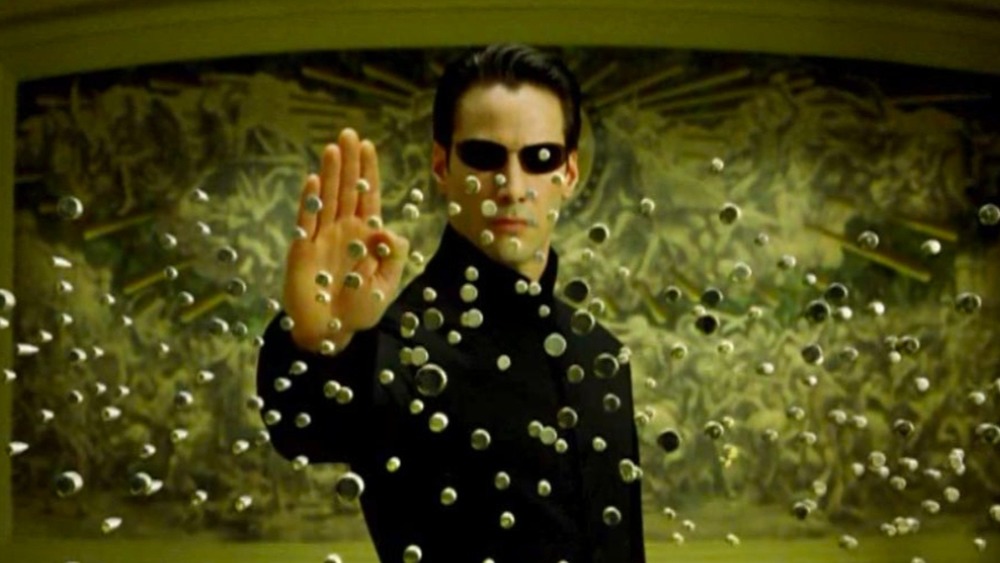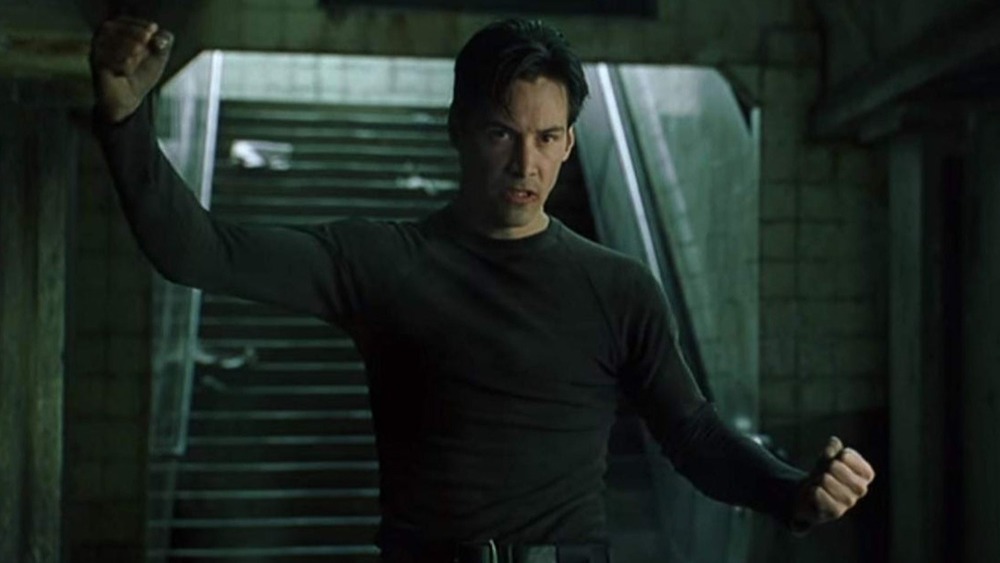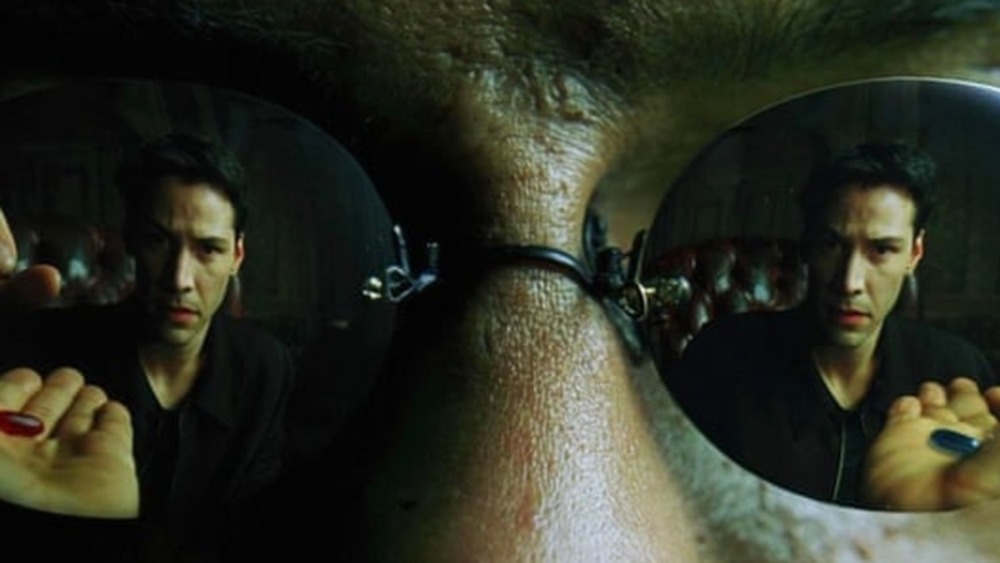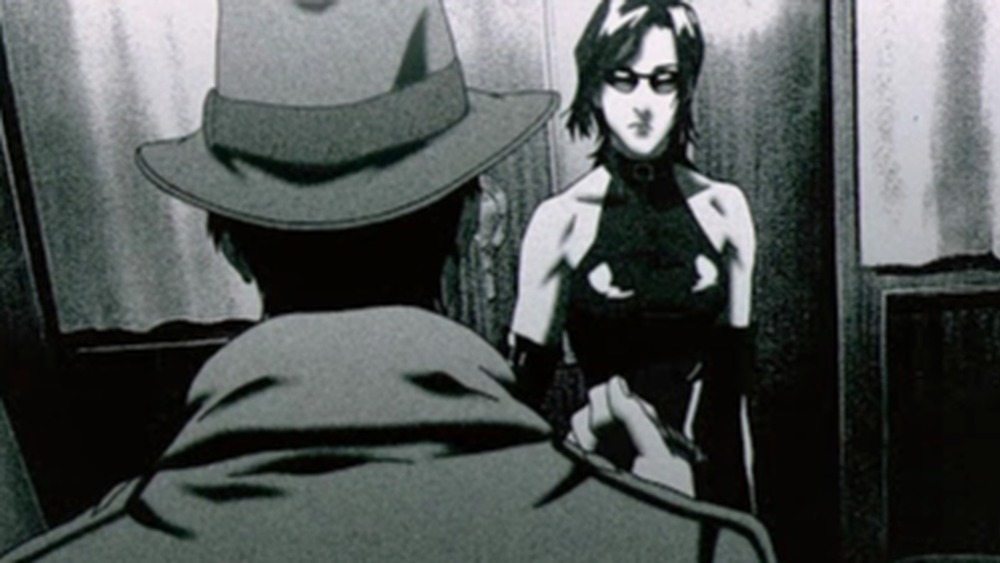Why The Matrix Is The Best Of The Matrix Trilogy
On March 31, 1999, audiences everywhere were introduced to sibling directing duo Lana and Lilly Wachowski's The Matrix, forever altering the course of film history. The movie follows Neo (Keanu Reeves) in his quest to escape his false reality and become the prophesied "One" to defeat humanity's machine overlords. This highly experimental, green-tinted dystopian thriller took the world by storm, raking in $463.5 million at the worldwide box office and receiving critical acclaim from all sides. Naturally, with such a remarkable response, Warner Bros. made the most logical next step a major studio can make: order more Matrix content for the masses to enjoy.
The Matrix's most well-known continuations are the two live-action sequels, which will become three in 2021 with the release of The Matrix 4. Both The Matrix Reloaded and The Matrix Revolutions hit the big screen in 2003 — on May 15 and November 5, respectively — much to the delight of fans and Warner Bros. alike. However, when the dust settled, that joy quickly faded into everything from despair to total confusion. It became abundantly clear that these follow-up movies couldn't recreate the same magic of the first, earning The Matrix the title of the best installment of the Wachowski's trilogy. Here's why.
The Matrix does action right
While most of The Matrix is dialogue-driven narrative, the film certainly doesn't shy away from sprinkling in some action now and again. There are plenty of gunfights, hand-to-hand martial arts encounters, and more throughout its runtime, quickening the pace a bit when the tedious exposition becomes too overwhelming. Reloaded and Revolutions employ their fair share of fight scenes as well — the latter even providing a mech battle to boot — but their attempts miss the mark relative to their trend-setting, parody-spawning predecessor.
The majority of the movie's action takes place inside the titular simulation, so the limitations of reality aren't necessarily in play for The Matrix. This gave the Wachowskis free rein to stylize these sequences, and they made some groundbreaking creative choices. Effects like slow-motion, as seen in the famous bullet-dodging scene, or fast-forward punches and cable-aided "levitation" kicks from Neo's fight with Agent Smith (Hugo Weaving) integrate perfectly into the story and universe. The Matrix's action isn't so over-the-top that it brings you out of the story, yet it isn't so sparse that when it comes up, it prompts a double-take.
Unlike those that came after it, The Matrix finds a happy medium, adding just enough appropriate action without overshadowing the already-complex narrative.
The Matrix's subtext is unmatched
A huge point of praise for the Matrix franchise as a whole is the thought-provoking nature of the narrative and the subtext to it. On a surface level, these films are about Neo's path to asserting himself as the savior of the human world, pushing the boundaries of reality, time, and space in the process. The two Matrix sequels do a fine job of continuing this interesting story; however, they very much drop the ball when tasked with providing rich, underlying themes that the original covertly posed to audiences in 1999.
First and foremost, The Matrix begs the question of what reality truly is and how society has come to understand the world around it. Early in the movie, Neo accepts his existence for what it is and doesn't consider the legitimacy of his environment. He eventually learns of the simulation from Morpheus (Lawrence Fishburne), which pushes him to wake up — literally and metaphorically — in his actual body. Neo is the audience surrogate, presenting them with a new form of Plato's famous Cave allegory that prompts them to stay inquisitive and resist becoming a passive observer in life.
Additionally, The Matrix also takes care to analyze the concept of the individual, and the decision to embrace or reject the identity that comes with it. Neo's journey from the lowly hacker Mr. Anderson to humanity's messiah is a dramatic transformation that culminates in the acceptance of his true self and the shedding his artificial one. This arc coincides perfectly with Lilly Wachowski's recent revelation that The Matrix is a metaphor for the transgender experience (via BBC News), further tying its messaging to the real world.
The delivery of such philosophical concepts, while still finding room to indulge the audience's love for escapist fiction, is never fully realized again in the Matrix trilogy.
The Matrix isn't hampered by ancillary media
Following the release of The Matrix, media fleshing out its fictional universe sprung up in all forms. Video games like Enter the Matrix, the Animatrix anthology film, and publications such as The Matrix Comics slowly began to expand upon the world depicted on the silver screen. While this is a very common practice today, it wasn't the norm in the early 2000s. With important characters and plot elements debuting outside of the movies, it becomes hard to follow the minutiae of the already-weak Reloaded and Revolutions — a struggle that their predecessor doesn't face.
Before 1999, The Matrix wasn't an established IP, and it didn't stem from any longstanding, pop-culture-dominating canon. It began as an original idea from the Wachowskis, complete with realized characters, a tight story, unique lore, and a concise vision behind it. There were no prequel novels, no comic books to explain everyone's backstory, no homework. The most casual of moviegoers could purchase their ticket and enter The Matrix on the ground floor, working out the philosophical conundrums it presents alone without worry of being behind the curve.
Of course, this isn't to say that expanding on a franchise's canon through mediums other than film is a bad thing — the likes of Star Wars and Marvel have done it to great success. After all, the Wachowskis played a big hand in bringing almost every project with the Matrix name on it to life, slotting it into the chronology properly. However, it is an issue when that media impacts the quality of everything it ties back to, making a day at the movies feel like a chore. The Matrix alone doesn't have that problem, and certainly has the least among its trilogy counterparts.



